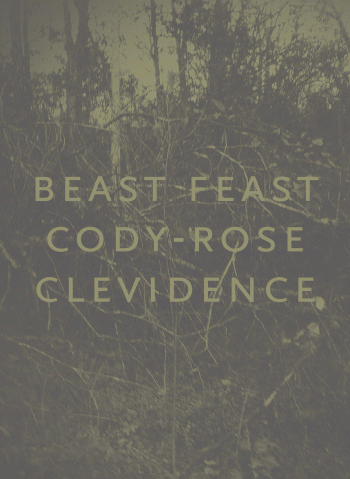
Beast-Feast by Cody-Rose Clevidence
a review by Jessica Rae Bergamino
Cody-Rose Clevidence
Ahsahta Press
99 pages
$18.00
In a poetic moment characterized by innovative explorations and reimaginations of the body, Cody-Rose Clevidence’s Beast-Feast stands out as an exciting, vital contribution to this growing conversation. The book explodes notions of gender and ferality by performing a ritual of rewilding, asserting the evolution of the human body to beast body as direct resistance to structures of gender, patriarchy, and capitol.
In her recent essay defining and exploring the necropastoral, Joyelle McSweeney writes that “rather than maintaining the didactic or allegorical distance, the membrane separating the Pastoral from the Urban, the past from the future, the living from the dead, may and must be supersaturated, convulsed, and crossed.” Beast-Feast is deeply invested in collapsing this distance, exploding both the body and the garden it is wrested from. “is an arsenal enough to free an orchard?” Clevidence asks. “swampthing, / inebriate. I’ll arm a garden. we can all live there.”
Beast-Feast imagines a collective reemergence of our wild bodies, demanding that we, in our becoming-feral states, agree to protect and reassert our deep entanglement with the landscape. “let’s cast aside these castrated lilies, slip out of this graceful masculinity,” Clevidence writes, invoking the grief inherent to the pastoral. “what idyll is rough-hewn from raw cement, what cash is pure, what baboon erects a monument to god – a monument of coin.” As readers, we are given a distinctly queer poetic that carries with it the fierce, radical possibility for becoming both more than the sum of our pastoral and more than the limits of our gender.
Clevidence offers a way of being in the world where nature operates within and upon the skin, sharking equally with power and fear. Tonally, these poems oscillate between a deep lyricism and formal concerns with the tradition they are inheriting and rejecting. In “ILXID,” for instance, Clevidence writes “Ov u have robbed it us, of the blinding thing, u who loved . we [ who hate & ] fall back from loves as grains from stalks into our own chaste nothingness.” Just as the feral body cannot separate itself from the wild unknown, so the reader cannot separate themselves from the either the material of the poem. Language, as poetry readers know, is constantly reimagining that separation, and these poems must engage in the fraught relationship between their very material and the materiality of the world it is refusing. “O)))))))))))))” offers the most discreet consideration of this binary: “I have an I made out of many eyes; compiled. / each blink joins the blinking. each blink is a seed, / “un petit mort” – a recalibration.” Our small death, our orgasm, our recalibration of self collapses the boundaries between vision and speech while simultaneously collapsing the gesture between the gaze and the gazed. The poem continues
except with what senses you sense with
skin my eye touch tongue my greed is
historic, odorous & loud.
How, Beast-Feast asks, can we be anything short of terrified of the limitations of our bodies? Of the social construction of our vision under Capitalism? My greed is historic, yes; it separates my body from the body of the land, my beast self from my social self. Sorting these distinctions, however, isn’t the work of Beast-Feast. This isn’t a map, but it is a howl.
